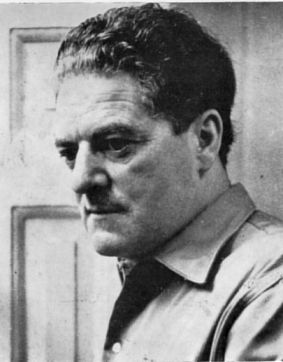View entry
Name: HANLEY, Gerald A.

Birth Date: 17 Feb 1916 Liverpool
Death Date: 2 Sep 1992 Dun Laoghaire
First Date: 1934
Profession: Novelist and writer
Area: Nanyuki
Married: 1. 1942 Diana Fittall b. 1920 (dau. of Robert Joseph Fittall); 2. In Surrey 1950 Asha Sharma Wemyss (also m. in Pakistan?) (Brahmin woman)
Children: 7 children with Diana; 2 with Asha incl. son P.L. ((1950)
Author: 'Drinkers of Darkness', 'Warriors and Strangers'
Book Reference: Sitrep 2, Hut, Wikipedia
War Service: KAR in Somalia and Burma
General Information:
His brother was the novelist and playwright James Hanley, while the American novelist and playwright William Hanley was his nephew. William's sister Ellen Hanley was a successful Broadway actress. Gerald Hanley died on 7 September 1992, in Dun Leaoghaire, Ireland.
Dictionary of Irish Biography Hanley, Gerald (1916–92), writer, was born 17 February 1916 in Cork, younger son of Edward Hanley, merchant seaman, and Brigid Hanley (née Roche). His father had forsaken an established family printing business and legal studies to go to sea (and adding an ‘e’ to his original surname, Hanly); his mother hailed from a long line of seafarers. This self-reliance was carried through to the next generation: Gerald's older brother, the writer James Hanley (qv), ran off to sea at age 13, and Gerald himself left home at 16 to take up farming in Kenya. At the outbreak of war in 1939 Hanley joined the Royal Irish Fusiliers and saw service in Somaliland, where conditions were so difficult that seven fellow-officers committed suicide. He was then in Burma with the 11th East Africa Division as a war correspondent, and took part in a campaign at Khabaw valley which led to establishing a bridgehead at Kalewa to open the way to Mandalay. He drew on this to write his first novel, Monsoon victory (1946).
After the war he worked for the press agency J. Arthur Rank in India and for the BBC overseas service in Pakistan; but he did not much enjoy this work, and in 1950 settled in a thatched cottage in Palumpar in the Himalayas, where he lived frugally and wrote Consul at sunset (1951). Generally held to be his best novel, it deals with British colonial officers’ handling of an African tribal dispute over a waterhole, and is distinguished by Hanley's terse unsentimentality. His next two novels were also set in Africa and well reviewed, but The journey homeward (1961) and his last novel, Noble descent (1982), deal with Indian and Pakistani independence, and are weaker works. He used Africa as his subject again for the travel book, Warriors and strangers (1971), one of the best European attempts to describe the experience of living in Africa. In the late 1960s he returned to Ireland and settled in Wicklow, where he wrote scripts and radio plays as well as novels. His most famous screenplay was for the film The Blue Max (1966), about German pilots in the first world war, directed by John Guillermin and filmed in Ireland. He was also one of the many scriptwriters on Richard Attenborough's Ghandi (1982). After 1982 he published no more, and died 7 September 1992 in Dublin. He was survived by his companion, Kate Carney.
Hanley is very much a mid-twentieth-century author, whose unvarying theme is the dissolution of empire, and the social, political, and personal tensions this creates for the subject and colonial people. He was inevitably compared to Graham Greene, and was admired by Hemingway. His nine novels enjoyed moderately good reviews. Though he never gained the critical acclaim of his brother James, he probably had better sales. His work does not rise to the bleak, uncompromising despair of his brother's, but is not dissimilar in its unsentimentality, its clear, unvarnished prose, and its sense of alienation.
